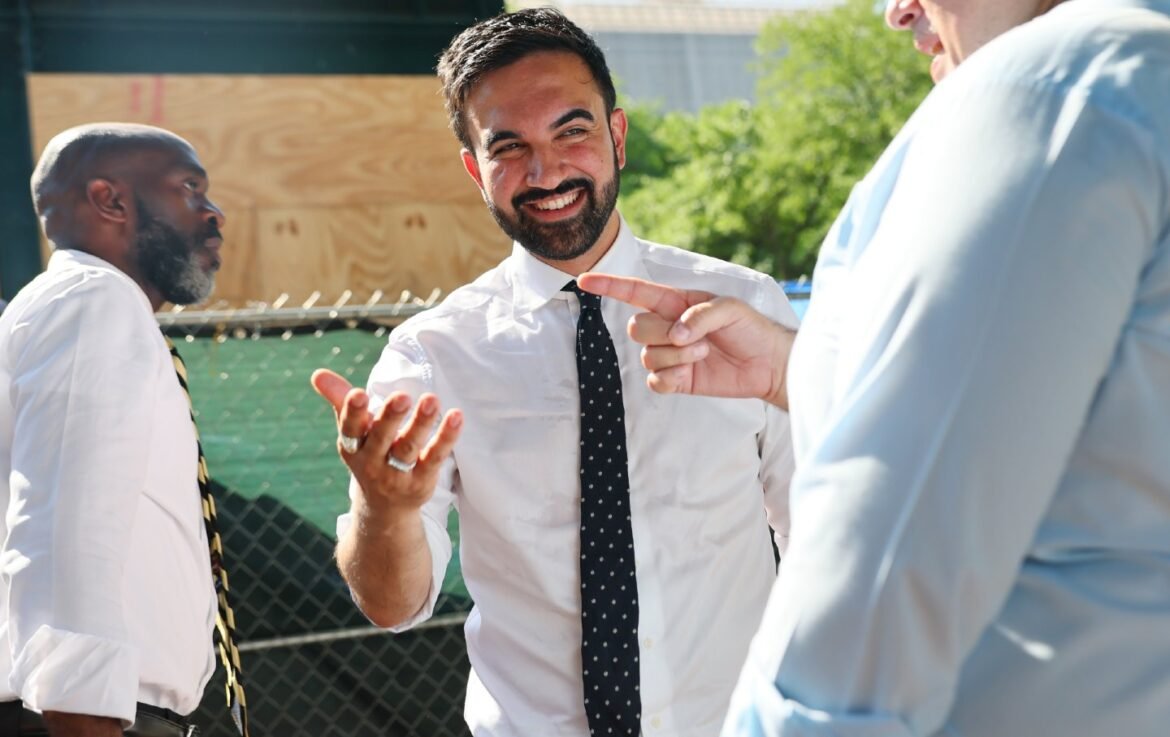Once they get over the shock, the idea-starved Democrats at the national level should learn from Zohran Mamdani: actually give citizens something to vote for.

New York mayoral candidate state Assemblyman Zohran Mamdani (D-NY) greets voters with Democratic mayoral candidate Michael Blake on 161st Street on June 24, 2025, in the South Bronx in New York City.
(Michael M. Santiago / Getty Images)
At every level, Zohran Mamdani’s exuberant economic populist campaign for the New York City Democratic mayoral primary has been a rebuke to the conventional wisdom of a desiccated and idea-starved Democratic establishment. Threatened with everything from crass Islamophobia and fabricated charges of antisemitism to the specter of an Ayn Randian capital strike, Mamdani continued to focus on a reform agenda addressing the basic needs of New Yorkers struggling to get by: eliminating fares on city buses, expanding the city’s housing stock while freezing rents, and increasing taxes on corporations and the wealthy. His victory marks a clear inflection point in the roiling debate over how the Democratic Party needs to reinvent itself in the wake of 2024.
Mamdani has successfully revived the appeal to what another insurgent candidate, Howard Dean, used to call “the democratic wing of the Democratic Party”—and in so doing, he’s cleared a path for national Democrats to reclaim their own voice as the party of the people. In his primary night victory speech, Mamdani referenced Franklin Roosevelt’s diagnosis of the authoritarian drift of the 1930s, which held that citizens of strongman regimes succumbed to despots’ blandishments out of desperation in the face of “government confusion and weakness,” rather than breaking with democratic principle. Mamdani hailed his win as evidence that “if we’ve made one thing clear, it’s that we need not choose between freedom and fairness.”
That was the theme of his campaign, which saw him surge from an early 30-point polling deficit against former New York governor Andrew Cuomo, a true avatar of brain-dead Democratic status-quo governance. Cuomo was the designated spirit animal of a national party in thrall to big-ticket donors and sinecure holders, who rallied to endorse a political leader who should have languished in richly deserved disgrace. Cuomo-aligned super PACs sluiced more than $33 million into the primary, converting the election into a referendum on the moneyed braintrust behind the national party. His main super PAC, Fix the City, garnered $25 million, the largest haul ever for a mayoral campaign—much of it via the deep pockets of former GOP mayor Michael Bloomberg.
But even that lavish outlay wasn’t enough to prop up the candidacy of a fatally out-of-touch and corrupt hack politician. As governor, Cuomo had condemned thousands of senior New Yorkers to die in overwhelmed nursing homes at the height of the Covid-19 pandemic, and then schemed to conceal the actual death toll. He had also been forced to resign under credible charges of sexual harassment, and sought during his mayoral run to discredit his accusers. And in an unforced governing error with disastrous national consequences, he cut a deal with the New York Republican Party to create a new clutch of gerrymandered congressional districts that made the difference in the national GOP’s narrow hold on a House majority in the 2022 midterms. A desperate big-money party establishment might have simply nominated a Thomas Nast rendering of a dollar-headed Tammany pol and stood a better chance at victory.
The Mamdani-Cuomo showdown indeed functioned as a distilled version of the same ideological and generational battle now convulsing the national Democratic Party. The Democratic National Committee has parted ways with vice chair David Hogg, a 25-year-old survivor of the Parkland, Florida, school massacre, in typically myopic and change-averse fashion. More recently, two influential union leaders—Randi Weingarten, head of the American Federation of teachers, and Lee Saunders, president of the American Federation of State, County and Municipal Employees—have declined at-large posts with the group after DNC chair Ken Martin blocked their membership on the powerful Rules and Bylaws Committee, which typically selects candidates to back and sets election priorities.
Weingarten called out Martin’s leadership for not doing more to combat the regressive spending cuts in the GOP’s signature tax bill, and bemoaned the group’s status-quo thinking. In her resignation letter, she wrote that she didn’t “want to be the one who keeps questioning why we are not enlarging our tent.” Saunders likewise said that Democrats need to embrace change and broaden their electoral base. “These are new times. They deserve new strategies,” he told The Guardian. “We must evolve to meet the urgency of the moment. This is not a time to close ranks or turn inward.… It is our responsibility to open the gates [and] welcome others.” Martin, for his part, denies any animus toward the union leaders, or the labor constituency more broadly, saying “winning back the working class and stopping Trump from harming families is exactly where our focus is.”
In truth, it remains hard to see just where the party’s focus is. Yesterday, Texas Democratic Representative Al Green introduced a resolution for Trump’s impeachment for his unconstitutional bombing of Iran—and just 79 Democratic House members, fewer than half the party’s House caucus, voted against the motion to table the resolution. An even more embarrassing flight from coherence was the party’s embrace of the Wall Street–coined acronym “TACO”—for “Trump always chickens out”—the sort of cheap-seat hypocrisy-spotting that has long hamstrung the Democratic establishment from developing effective opposition tactics. The Iran bombing was an all too brutal reminder that it’s a good thing when Trump chickens out and climbs down from the GOP’s policy agenda.
Zohran Mamdani’s win is a powerful reproach to this brand of politics as social media catcalling. In bypassing the ritualized ethnic-identity pandering that’s long defined New York City electioneering, Mamdani brought many formerly disaffiliated voters back into the political process, while remaining focused on the needs of ordinary New Yorkers rather than on the wishes of big-ticket donors. And like FDR, he understands the basic mandate to give struggling and desperate citizens something to actually vote for. Let’s hope that, once the shock wears off, the Democratic Party establishment strategists will start, at long last, to follow his example.
Every day, The Nation exposes the administration’s unchecked and reckless abuses of power through clear-eyed, uncompromising independent journalism—the kind of journalism that holds the powerful to account and helps build alternatives to the world we live in now.
We have just the right people to confront this moment. Speaking on Democracy Now!, Nation DC Bureau chief Chris Lehmann translated the complex terms of the budget bill into the plain truth, describing it as “the single largest upward redistribution of wealth effectuated by any piece of legislation in our history.” In the pages of the June print issue and on The Nation Podcast, Jacob Silverman dove deep into how crypto has captured American campaign finance, revealing that it was the top donor in the 2024 elections as an industry and won nearly every race it supported.
This is all in addition to The Nation’s exceptional coverage of matters of war and peace, the courts, reproductive justice, climate, immigration, healthcare, and much more.
Our 160-year history of sounding the alarm on presidential overreach and the persecution of dissent has prepared us for this moment. 2025 marks a new chapter in this history, and we need you to be part of it.
We’re aiming to raise $20,000 during our June Fundraising Campaign to fund our change-making reporting and analysis. Stand for bold, independent journalism and donate to support The Nation today.
Onward,
Katrina vanden Heuvel
Publisher, The Nation

